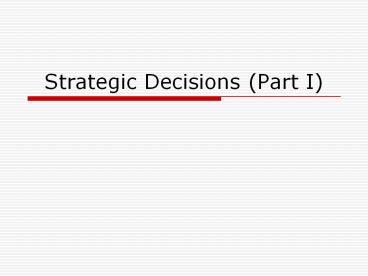Strategic Decisions (Part I) - PowerPoint PPT Presentation
1 / 15
Title:
Strategic Decisions (Part I)
Description:
Strategic Decisions (Part I) Decision Phases of a Supply Chain Supply chain strategy or design Automate flow of information between company and supply chain partners ... – PowerPoint PPT presentation
Number of Views:155
Avg rating:3.0/5.0
Title: Strategic Decisions (Part I)
1
Strategic Decisions (Part I)
2
Decision Phases of a Supply Chain
- Supply chain strategy or design
- Automate flow of information between company and
supply chain partners - Supply chain planning
- Generate demand forecasts for a product (demand
planning) and help develop sourcing and
manufacturing plans for that product - Supply chain operation
- Manage the flow of products through distribution
centers and warehouses to ensure that products
are delivered to the right locations in the most
efficient manner
3
Supply Chain Strategy or Design
- Decisions about the structure of the supply chain
and what processes each stage will perform - Strategic supply chain decisions
- Locations and capacities of facilities
- Products to be made or stored at various
locations - Modes of transportation
- Information systems
- Supply chain design must support strategic
objectives - Supply chain design decisions are long-term and
expensive to reverse must take into account
market uncertainty
4
Supply Chain Processes
- Plan Balancing demand and supply to meet
sourcing, production, and delivery requirements - Source Procurement of goods and services needed
to create a product or service - Make Processes that transform a product into a
finished state - Deliver Processes to manage order transportation
and distribution - Return Processes associated with product returns
and post delivery customer support
5
Processes and Related Efficiency Problems in
Supply Chain
- Processes
- Inventory moving through a retail store or
warehouse - Products moving by trucks, trains and ships
through a supply chain - Efficiency Problems
- What is the best delivery policy for goods at a
warehouse? - How much inventory should be kept on the shelves
in a retail store - How should inventory be distributed along a
supply chain
6
Demand Forecasting in a Supply Chain
- The basis for all strategic and planning
decisions in a supply chain - Used for both push and pull processes
- Examples
- Production scheduling, inventory, aggregate
planning - Marketing sales force allocation, promotions,
new production introduction - Finance plant/equipment investment, budgetary
planning - Personnel workforce planning, hiring, layoffs
- All of these decisions are interrelated
7
Forecasting Methods
- Qualitative primarily subjective rely on
judgment and opinion - Time Series use historical demand only
- Static
- Adaptive
- Causal use the relationship between demand and
some other factor to develop forecast - Simulation
- Imitate consumer choices that give rise to demand
- Can combine time series and causal methods
8
Understanding the Supply Chain
Cost-Responsiveness Efficient
Responsiveness
High
Low
Cost
High
Low
9
Comparison of Efficient and Responsive Supply
Chains
Efficient Responsive
Primary goal Lowest cost Quick response
Product design strategy Min product cost Modularity to allow postponement
Pricing strategy Lower margins Higher margins
Mfg strategy High utilization Capacity flexibility
Inventory strategy Minimize inventory Buffer inventory
Lead time strategy Reduce but not at expense of greater cost Aggressively reduce even if costs are significant
Supplier selection strategy Cost and low quality Speed, flexibility, quality
Transportation strategy Greater reliance on low cost modes Greater reliance on responsive (fast) modes
10
Case Study Bayers Forecasting and Planning with
SAP
- A large healthcare company with more than 36,000
employee and recently underwent a restructuring. - It requires a new solution that give key regional
market direct access to the central planning
system.
11
Bayer HealthCares Challenges
- Realign planning processes in response to
groupwide restructuring - transparency in forecasting and inventory
- reduction in stocks of sales articles awaiting
distribution.
12
Bayer HealthCares Supply Chain Solution
- To integrate central planning functions into the
regional sales subsidiaries more effectively and
implementing global sales and replenishment
/quantity planning - VMI both with and without consignment stock
forms the basis for centralized replenishment
/quantity planning
13
How did SAP technology help Bayer HealthCare?
- To involve an upgrade of SAP Advanced Planning
Optimization (SAP APO) functionality currently
available in mySAP Supply Chain Management
14
The Outcome
- Timely deliveries to customers
- Greater ability to control flow of goods and
inventory - Flexible, more accurate demand planning
15
Discuss the following questions
- What problems do Bayer HealthCare address? How
does SAP supply chain solution help solve these
problems? - What issues and challenges do Bayer HealthCare
present? What can be done to address these
issues? - What are the business as well as the technology
issues that should be addressed when Bayer
HealthCare implement SAP solution?































